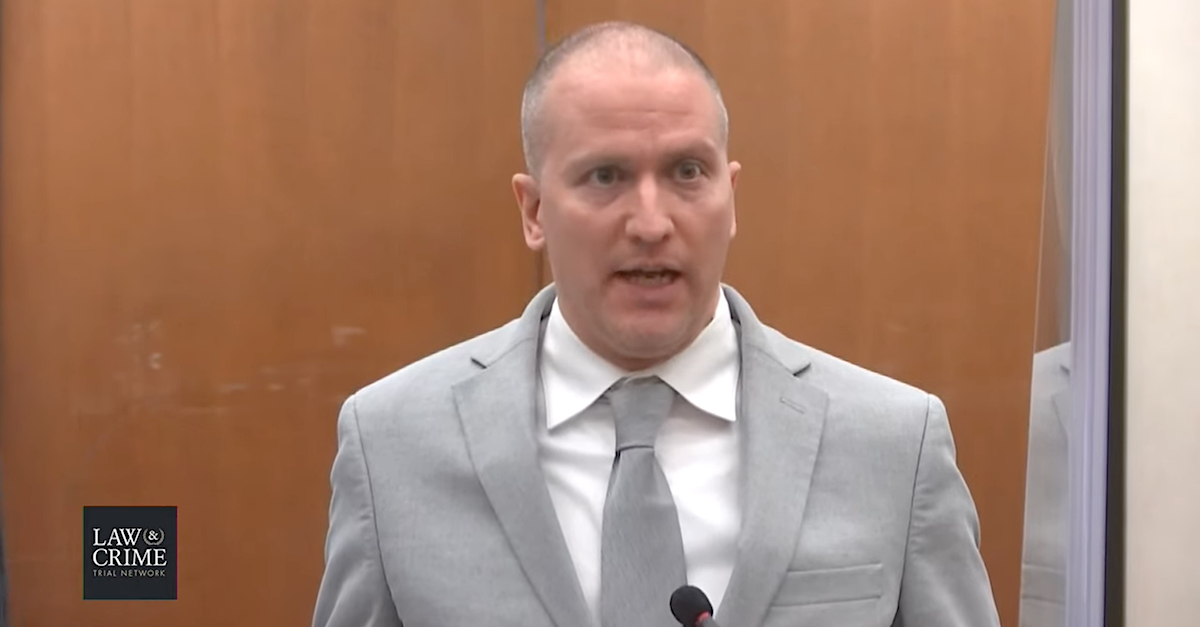
Derek Chauvin appears at his June 25, 2021 sentencing hearing in district court. The proceeding was carried live on the Law&Crime Network.
Convicted murderer Derek Chavin apparently isn’t poor after all — at least in the eyes of the law in Minnesota district court.
One day after deciding that Chauvin could proceed with court filings “in forma pauperis” — translated to mean “in the form of a pauper” — Judge Peter Cahill changed his mind and reversed his decision. Cahill is the same judge who presided over Chauvin’s criminal trial in the death of George Floyd, Jr.
Defendants routinely file motions to proceed “in forma pauperis” to avoid paying the usual filing fees and other requisite costs when submitting documents to a court. On the afternoon of Thursday, Sept, 23, in a document timestamped 4:06 p.m., Cahill determined that Chauvin was, indeed, entitled to be viewed as legally poor and that the much-maligned ex-cop could “proceed in forma pauperis.”
“The applicant shall not be required to pay any fees, costs, and security,” that initial and since-rubbished court document explained. “The applicant’s claims are not frivolous and applicant is financially unable to pay any fees and entitled to proceed in forma pauperis.”
The perfunctory form was subsequently revoked less than a day later.
On the morning of Friday, Sept. 24, Cahill issued what in essence is a complete about face.
“Based on the affidavit of the applicant Derek Michael Chauvin and the authority of Minn. Stat. § 563.01 . . . [t]he applicant is not found to be indigent and is not entitled to proceed in forma pauperis.”
That document was electronically signed at 11:13 a.m. and filed at 11:30 a.m.
The ultimate decision means Chauvin will have to pay filing fees for future court documents in any residual district court proceedings.
The move came shortly after Chauvin asked the Minnesota Court of Appeals to examine his murder conviction. Chauvin issued a laundry list of alleged procedural errors in the trial which resulted in a 270-month sentence. He’s proceeding with the appeal without an attorney because the Court of Appeals refused to appoint him an appellate public defender. Chauvin has asked the Minnesota Supreme Court to examine that denial according to separate papers filed with the Court of Appeals. Here’s how Chauvin laid out that argument:
- My name is Derek Michael Chauvin, and I believe I have valid grounds for pursing a Court of Appeals action.
- April 20, 2021, I was found guilty of unintentional second-degree murder while committing a felony; third-degree murder, perpetrating an eminently dangerous act evincing a depraved mind; and second-degree manslaughter, culpable negligence creating an unreasonable risk.
- On June 25, 2021, I was sentenced to imprisonment for a term of270 months.
- I am currently incarcerated at Minnesota Correctional Facility, Oak Park Heights.
- On 20 Sep 2021, I filed a pro se notice of appeal with the Minnesota Appellate Court clerk.
- I am currently unrepresented by legal counsel in connection with the appeal.
- On August 27, 2021, I applied for a Minnesota appellate public defender to represent me.
- On September 14, 2021, I was denied representation by the public defender.
- I have submitted the necessary documents to the Minnesota Supreme Court review the public defender’s denial of representation.
- Due to my current incarceration, I do not have the sufficient means to retain private counsel for the appeal.
- I currently have no source income, besides nominal prison wages, nor do I own any real property or vehicles.
- I am currently unmarried and have no dependents.
- My only assets are two retirement accounts. I would face a significant penalty for early access to these retirement funds.
- After the penalty for early access to the retirement funds, the remaining amount would be less than the current debt I owe, including IRS taxes and other personal debt.
- The district court case for which I intend to appeal was paid for by the Minneapolis Peace and Police Officer’s Association, and I have been informed that their obligation to pay for my representation terminated upon my conviction and sentencing.
- I therefore move for an order staying my appellate brief filing deadline upon the Minnesota Supreme Court’s review of the denial of my application for an appellate public defender.
Minneapolis NBC affiliate KARE-11 confirmed that Eric Nelson, Chauvin’s trial attorney, “does not represent Mr. Chauvin on the state appeal at this time,” citing his law firm.
Read the appellate paperwork below:
Read Judge Cahill’s decisions below:
[image via the Law&Crime Network]